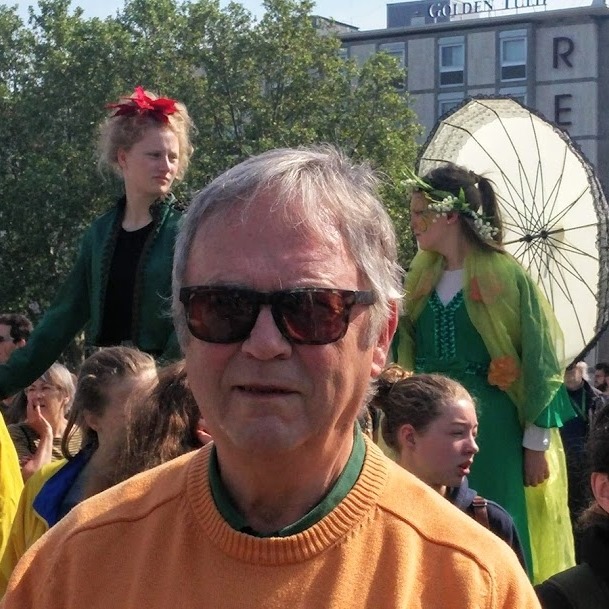In any event, both Teilhard's challenging book The Phenomenon of Man (1959) and McLuhan's challenging 1962 book The Gutenberg Galaxy: The Making of Typographic Man represent new grand syntheses - as does Ong's mature work from the early 1950s onward.
Now, in the 1960s, Ong published the following five books:
(1) Darwin's Vision and Christian Perspectives (Macmillan, 1960);
(2) The Barbarian Within: And Other Fugitive Essays and Studies (Macmillan, 1962), mentioned above;
(3) In the Human Grain: Further Explorations of Contemporary Culture (Macmillan, 1967a);
(4) The Presence of the Word: Some Prolegomena for Cultural and Religious History (Yale University Press, 1967b), the expanded version of Ong's 1964 Terry Lectures at Yale University;
(5) Knowledge and the Future of Man: An International Symposium (Holt, Rinehart and Winston, 1968).
In the 1969 book The Feast of Fools: A Theological Essay on Festivity and Fantasy (Harvard University Press), the Protestant theologian Harvey Cox discusses Ong in his "Appendix: Some Relevant Theological Currents" (pp. 163-177) in the subsection on Theology of culture (pp. 166-167). Cox says that "With the death of Paul Tillich" . . . "No single figure has appeared to claim his place as the principal theological interpreter of such cultural forms as painting, music, architecture, and dance. . . . Only Walter Ong makes much of an attempt to pull together the whole range of cultural artifacts into a single inclusive theological interpretation" (p. 166).
In Cox's "Notes" (pp. 179-197), he lists three books by Ong: (1) The Barbarian Within (1962); (2) In the Human Grain (1967a); and (3) The Presence of the Word (1967b) (Cox, 1969, p. 196) - all three of which I mentioned above.
Now, in a recent wide-ranging article titled "Hijacking St. Patrick's Cathedral: What the funeral of a trans activist says about our cultural politics" (dated March 27, 2024) in the lay liberal American Catholic magazine Commonweal, the lay liberal American Catholic author and commentator Dr. Peter Steinfels (born in 1941; Ph.D. in history, Columbia University, 1964), the author of The Neoconservatives: The Men Who Are Changing America's Politics (Simon and Schuster, 1979) and A People Adrift: The Crisis of the Roman Catholic Church in America (Simon & Schuster, 2003), characterizes the 1960s as the "most accessible starting point for the "very large topic" of "cultural factors that create the distorting filter of distrust through which the economic factors are viewed" by many Americans today.
Click Here...
Dr. Steinfels' article is about the publicity provoked by the funeral service -- without a funeral Mass -- held at St. Patrick's Cathedral in New York City on February 15, 2024, for the self-proclaimed atheist and transgender activist Cecilia Gentili (1972-2024). In addition to reading the publicity about what he styles as a pseudo-event (a pejorative term coined by Daniel J. Boorstin [1914-2004; SJD, Yale University, 1940] in his 1962 book The Image: A Guide to Pseudo-events in America - ah, the 1960s again!), Dr. Steinfels also watched the hour-long film of the pseudo-event of the funeral service at St. Patrick's Cathedral for Cecilia Gentili on February 15, 2024.
More to the point, Dr. Steinfels characterizes the 1960s as involving "the profound shaking of taken-for-granted notions about race, sexuality, gender, religion, and the meaning of America." Yes, that much is true about the 1960s.
However, as Dr. Steinfels himself says, it is a "very large topic" to explore just exactly how "cultural factors" that have evolved since the 1960s to today "create the distorting filter through which the economic factors [today] are viewed" by many Americans today. I am not going to undertake such a challenging exploration in the present essay.
As we noted above, in Grace Elizabeth Hale's 2010 book A Nation of Outsiders: How the White Middle Class Fell in Love with Rebellion in Postwar America, she calls our attention to what Dr. Steinfels refers to as "cultural factors" involving "the profound shaking of taken-for-granted notions about race, sexuality, gender, religion, and the meaning of America" in the 1960s as involving what Hale refers to as rebellion.
In any event, Trump's most adamant white supporters over the last decade have not been motivated by economic factors. Thie adamant support for him suggests that they probably were not part of the white middle class that fell in love with rebellion in postwar America. In short, Trump's most adamant white supporters were probably not involved in "the profound shaking of taken-for-granted notions about race, sexuality, gender, religion, and the meaning of America" in the 1960s that Steinfels refers to - or if they were involved in the 1960s, they have since changed their views (which may be the case with Trump himself).
Next Page 1 | 2 | 3 | 4 | 5 | 6 | 7 | 8 | 9
(Note: You can view every article as one long page if you sign up as an Advocate Member, or higher).





